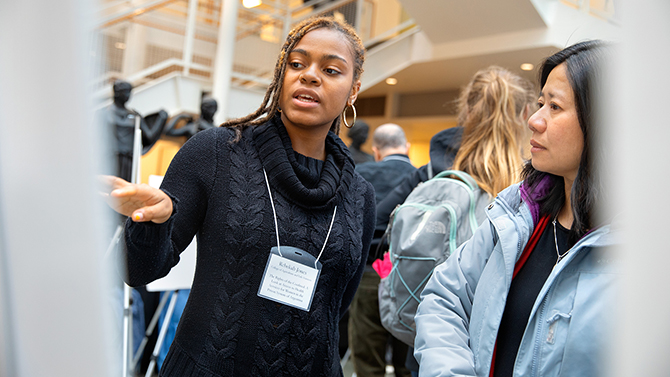
Students are contributing to higher education’s public impact and preparing to support community-engaged learning courses through the Einhorn Center’s new Community-Engaged Learning and Teaching (CELT) Facilitators Program. The program is open to all undergraduate and graduate students, especially current or future teaching assistants (TAs) and course assistants (CAs) in community-engaged learning (CEL) courses.
In the 12-hour hybrid (in-person and online) program, participants learn the basics of CEL, or learning that takes place in partnership between students, faculty and communities; the different forms it can take across disciplines and projects; and how to support other students’ community-engaged experiences. A major part of the program is learning to facilitate critical reflection exercises, a key component of CEL through which students consider their community-based projects within broader socioeconomic systems.
Facilitators will also be able to help students integrate what they learn in the classroom with what they’re learning from community partners.
“In community-engaged learning, it is not just about the project but rather that everyone involved contributes to the equitable generation and dissemination of knowledge,” said Amy Somchanhmavong, associate director of Global Community-Engaged Learning Programs and co-lead in developing the CELT Facilitator Program. “After this program, participants have the practical skills to foster this kind of learning with and from their students and community partners.”
The program was developed to support the center’s Engaged College Initiative and help participating colleges incorporate community-engaged learning into their research, teaching and other programs. To that end, the CELT Facilitator Program will offer facilitation workshops for new and incoming TAs and CAs at the beginning and end of each semester.
Isabella Suffredini ’25, a student in the Nolan School of Hotel Administration, especially appreciated this three-hour, interactive session during a pilot run of the program last fall.
“I enjoyed that it was a small group setting and we were all able to contribute a lot to each conversation,” she said. “The facilitators of the program challenged us to think outside of our comfort zone, and I also liked that there were many different perspectives — graduate, undergraduate and a variety of majors — in the room.”
The in-person meeting is complemented by two online modules on eCornell that introduce participants to the four criteria of CEL — designing programs that come from community-identified needs; working with and learning from community partners; linking projects directly to coursework; and including structured, documented critical reflection throughout the experience.
At the end of the program, students reflect on what they have learned in whatever medium fits their own interests — be it a video or a rap performance.
“We really want the reflection piece to speak to a student’s own identity and what they’re passionate about,” said Jacob Dillabaugh, assistant director of the Engaged College Initiative, who co-leads the CELT Facilitators Program. “I think it allows for creativity and a kind of ownership of the experience.”
Equipped with new knowledge and skill sets, participants are better able to support faculty of CEL courses and foster spaces where students “feel comfortable and can surface their own assumptions and communicate with others who may have different experiences,” Dillabaugh said.
Community partners, in turn, benefit from students who are better educated and thoughtful about their community-engaged work, Dillabaugh explained.
“And this may lead to more positive, robust and long-term relationships between the community and faculty members,” he said.
Over time, Somchanhmavong and Dillabaugh hope, the CELT Facilitator Program will – like other Einhorn Center initiatives – also help build relationships across the university.
“We hope students from across different disciplines and different colleges are able to come together and talk through what it means to do community-engaged learning in their own context and learn from each other,” Dillabaugh said. “We are building a community of practice.”


